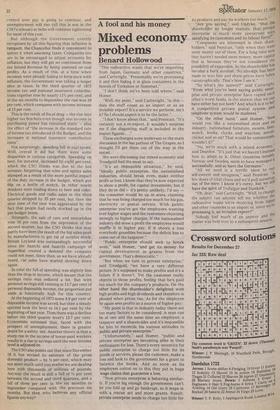A fool and his money
Mixed economy problems
Benard Hollowood
"This radioactive waste that we're importing from Japan, Germany and other countries," said Cartwright. "Presumably we're processing it and then hiding it in glass containers in the bowels of Yorkshire or Somerset."
"I don't think we've been told where," said Homer.
"Well, my point," said Cartwright, "is this — does the stuff count as an import or as an invisible export? It's a service we perform, isn't it? So I should expect it to be the latter."
"I don't know about that," said Pemican. "It's certainly not a re-export. It wouldn't surprise me if the disgusting stuff is included in the import figures ..."
These exchanges were irrelevant to the main discussion in the bar parlour of The Grapes, so I thought I'd get them out of the way at the outset.
We were discussing Our mixed economy and Treadgold had the most to say.
. "It's an impossible situation," he said. "Ideally public enterprise, the nationalised industries, should break even, make neither profit or loss. I know that they're now expected to show a profit, for capital investment, but if they do or did — it's pretty unlikely, I'd say — the consumer would be up in arms, claiming that he was being charged too much for his gas, electricity or postal service. With public enterprise you've got the employees wanting ever higher wages and the customers objecting strongly to higher charges. If the nationalised industry did show a profit the employees would snaffle it in higher pay. If it shows a loss everybody grumbles because the deficit has to come out of the taxpayer."
"Public enterprise should seek to break even," said Homer, "and get its money for capital development in grants from the government. That's democratic."
"But when we turn to private enterprise," said Treadgold, "we have a very different picture. It's supposed to make profits and it's a failure if it doesn't. Yet the customer really objects to those profits, feeling that he's paid too much for the company's products. On the other hand the shareholder's delighted with high profits and high dividends and therefore is pleased when prices rise. As for the employee he again sees profits as a source of higher pay.
"My point is that in industry today there are too many factors to be considered. A man can be at one and the same time an employee, a taxpayer and a shareholder and it's impossible for him to reconcile his various attitudes to public and private enterprise."
"Unfortunately," said Homer, "public and private enterprise are becoming alike in their enthusiasm for loss. There's every incentive for public enterprise to charge too little for its goods or services, please the customer, make a loss and look to the government for a grant to balance the books. And as soon as its employees cotton on to this they put in huge wage claims that guarantee a loss.
"Now private enterprise is behaving similarly. If you're big enough the government Can't let you fold up and go bankrupt, so it steps in with a rescue act and more grants. Result: private enterprise tends to charge too little for its products and pay its workers too much."
"Are you saying," said Updyke, "that the shareholder no longer matters, that private enterprise is much more concerned with satisfying its customers and its labour force?"
"Companies are interested in their shareholders," said Pemican, "only when they want more money out of them. For a long time noW they haven't needed more money, more capital that is, because they've not considered the possibility of expansion. So the shareholder has become a back number. No attempt has been made to woo him and share prices have fallen catastrophically. That's how I see it." "So what's the answer?" said Cartwright. "From what -You've been saying public enterprise and private enterprise have copied each other's worst faults. Is the answer that we can have either but not both? And which is it to be? A corripetitive private postal system and telephone system would be madness."
"On the other hand," said Homer, "how would you like a nationalised shirt and tie industry, nationalised furniture, sweets, beer' scotch, books, clocks and watches, soccer, cricket and so on? That would be communism. wouldn't it?"
"No, We're stuck with a mixed economy, said Deardon. "It's just that we haven't learned how to adapt to it. Other countries notablY Norway and Sweden, seem to have managed it successfully, and so have the Germans." "All we need is a terrific blow to our self-esteem and smugness," said Pemican. "A few doses of total chaos and we'd pull ourselve,?„, out of the mire. I know it's corny, but we stm have the spirit of Trafalgar and Dunkirk." "Oh, dear," said Cartwright. "Well, to change the subject can anyone tell me whether the radioactive waste we're receiving from Japan,, and other countries is an import or, since we'rv processing it, an invisible export?" . Nobody had much of an answer and the matter was held over to a subsequent session.


























 Previous page
Previous page